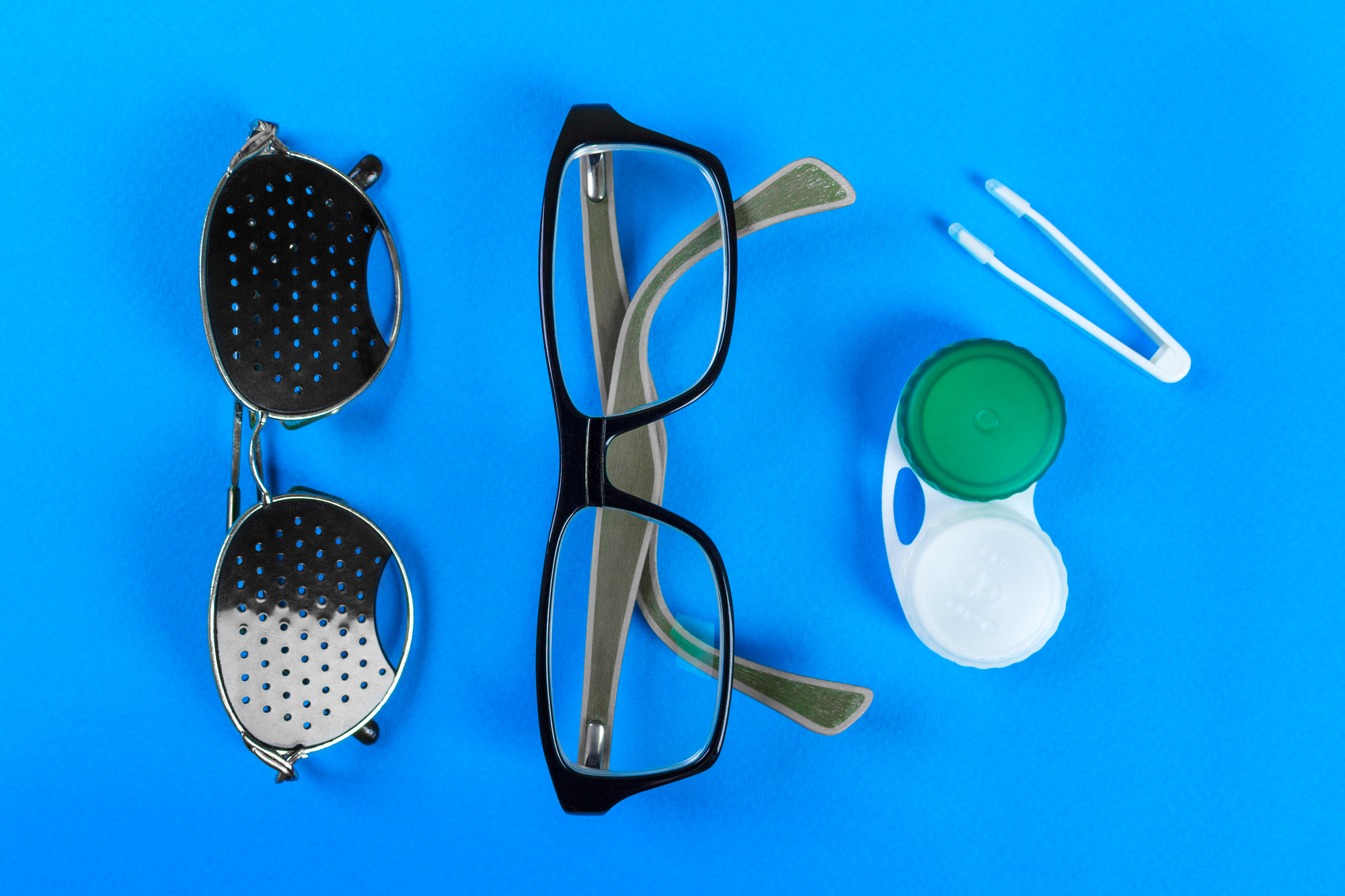Updated on February 20, 2024
Do Pinhole Glasses Really Improve Vision?


Vision Center is funded by our readers. We may earn commissions if you purchase something via one of our links.
What are Pinhole Glasses?
Pinhole glasses, also called stenopeic glasses, have tiny pinhole-sized dots filling a transparent lens.
Eye doctors commonly use pinhole glasses to screen for uncorrected refractive errors (eye shape disrupts the bending of light) and other vision problems.

Many claim that wearing pinhole glasses can improve eyesight by reducing symptoms of myopia (nearsightedness), astigmatism (abnormal eye curvature), and presbyopia (loss of ability to focus). However, there is no scientific evidence that they permanently enhance vision.1
Where to Buy Glasses + Contacts
Best Overall: Warby Parker
Fastest Delivery: EyeBuyDirect
Also Great: Liingo
Best Place to Buy Contacts: Discount Contacts
How Do Pinhole Glasses Work?
The tiny holes in pinhole glasses block indirect rays of light from entering the retina (layer in the back of the eye that senses light). Less light in the eye prevents vision distortion, resulting in a clearer image.
The stenopeic principle of pinhole glasses is similar to the effect of squinting. When only a narrow beam of light is allowed into the eye, the blur circle (light rays from each point on an object) is reduced, creating a sharper image.
When pinhole glasses improve visual acuity, it typically means that a person has an uncorrected refractive error.
Pinhole Glasses Claims and Uses
Pinhole glasses are used by eye doctors as a diagnostic tool and are not commonly used outside of the clinical setting.
In 1993, The United States Trade Commission banned the advertising of pinhole glasses as a way to improve vision permanently.4
Do They Improve Vision?
Pinhole glasses can temporarily improve vision for people with myopia, astigmatism, and presbyopia. However, they are not a treatment for vision disorders and only work while wearing glasses.
While pinhole glasses create a sharper image, they can disturb other areas of vision by:
- Shrinking the visual field
- Limiting peripheral vision
- Reducing contrast sensitivity
- Lacking stereopsis (depth perception)
Refractive errors, astigmatism, and presbyopia are best treated with customized glasses, contact lenses, or LASIK (laser eye surgery).
Do They Decrease Eye Strain?
Some companies advertise that pinhole glasses can decrease eye strain and help exercise and relax eye muscles, leading to clearer vision. However, no evidence supports that pinhole glasses permanently improve vision.
Studies have shown that wearing pinhole glasses while reading can worsen ocular symptoms, including:4
- Eye strain
- Discomfort
- Difficulty focusing
- Blurred and double vision
- Trouble concentrating
Other Benefits of Pinhole Glasses
Wearing pinhole glasses while reading or for extended periods can cause eyestrain and headaches. However, there are a few advantages to using them, including:
- Reduced glare when using a computer
- Improved depth of focus
- Increased accommodative amplitude (increase in ability to focus on an object)
- Improved vision for people with uncorrected visual acuity poorer than 20/20
When wearing pinhole glasses, one must be aware of visual field limitations while driving, playing sports, and working with dangerous instruments and equipment.
Where to Buy Pinhole Glasses
Pinhole glasses are sold by many popular companies, including Amazon and Walmart, both in the store or online. They are inexpensive and can typically be purchased for less than $10.
Licensed ophthalmologists mainly use pinhole glasses in the clinical setting.
How to Make Your Own Pinhole Glasses
You can make your pinhole glasses using materials from home.
The items you will need include:
- Old eyeglass frames (with the lenses taken out)
- Aluminum foil
- A pen or needle
First, cover both the eye holes in the glasses with aluminum foil. Fold it around the frame so it stays in place.
Second, put on the glasses and mark where the pupil of your eye lines up with the aluminum foil.
Third, take a pin and poke a hole in that spot. The hole needs to be small and round. Put them on and see if your vision becomes clearer. They work best in areas with lots of light, such as outdoors.
Summary
Licensed ophthalmologists commonly use pinhole glasses to determine if you have a refractive error. They work by reducing the amount of light reaching the retina, creating a sharper, clearer image.
While pinhole glasses can temporarily relieve people of common vision problems (myopia, astigmatism, or presbyopia), there is no evidence that pinhole glasses permanently improve vision.
Benefits of using pinhole glasses for short periods include sharper images, increased depth of focus, and reduced glare.
In this article
5 sources cited
Updated on February 20, 2024
Updated on February 20, 2024
About Our Contributors
Amy, a registered nurse with an M.S. in Nursing from California State University, Sacramento, and a B.A. in Journalism from California State University, Chico, is a freelance health writer for Vision Center. Her unique combination of nursing knowledge and journalism skills enables her to educate readers about eye health effectively. Amy's goal is to merge her nursing experience with her writing talent to raise awareness about common eye conditions and ways to prevent vision loss.
Dr. Melody Huang is an optometrist and freelance health writer with a passion for educating people about eye health. With her unique blend of clinical expertise and writing skills, Dr. Huang seeks to guide individuals towards healthier and happier lives. Her interests extend to Eastern medicine and integrative healthcare approaches. Outside of work, she enjoys exploring new skincare products, experimenting with food recipes, and spending time with her adopted cats.






